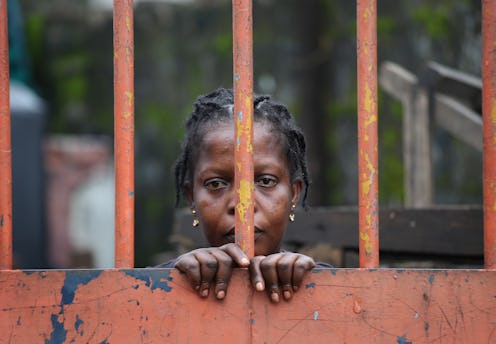News
Liberia's Ebola Quarantine Zone Isn't Going Well

It's easy to get panicky about the Ebola virus. It's a highly lethal infection, with no specific cure, and its recent outbreak across a number of West African countries is surging onward in spite of all attempts to handle it — the World Health Organization (WHO) has described it as out-of-control. Now, there are yet more troubling issues associated with the outbreak, which aren't even as much medical as political: Liberia's Ebola quarantine zone in Monrovia has led to clashes between government forces and citizens stuck inside the zone.
It's a worst-case scenario — a crippling disease bringing about a strident quarantine bringing about political and social unrest in a densely-populated, urban environment largely unequipped to combat the outbreak effectively. Liberia, and its capital city of Monrovia, home to the now-quarantined West Point neighborhood, is a country with a failing health system and countless, major public health crises that go far beyond just Ebola.
And the attempt to isolate the disease within West Point has inflamed suspicion and fear among residents, according to the New York Times. Specifically, residents are concerned the government is trying to turn their underserved slum into a tightly-restricted Ebola zone.
As Newsweek points out, the concept somewhat echoes the medieval concept of plague towns, which were common during the deadly sweep of the bubonic plague in Europe in the middle ages, areas isolated from the outside and filled with misery and disease. Residents of West Point are reportedly angry that some Ebola patients from outside their neighborhood are being contained there as well, inside a school the government aimed to turn into a center dedicated to containing the disease.
Basically, the full weight of Liberia's Ebola crisis is getting laid on the backs of some of its poorest citizens, and they aren't happy. But with Liberia's health systems as poor as they are, it's hard to really know from an outsider's perspective whether this strategy can even be successful, much less moral. Monrovia is a city teeming with nearly one million residents, and the possibility of Ebola spreading wildly throughout the city would be devastating.
The extent of the crisis writ large has been getting worse and worse as weeks roll by — according to the WHO, over 1,200 people have died across West Africa, and well over 2,000 have been infected.
If you're looking for a silver lining in all this, that's actually less lethal than the virus has been in the past — it's killing people about 54 percent of the time throughout this outbreak, whereas past incidents boasted a mortality rate around 90 percent.